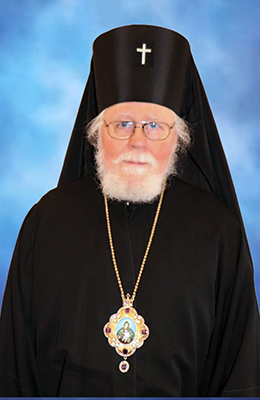

The Most Reverend
HARALAMPOS
Archbishop of Dallas and Texas
Nameday: February 10 / 23.
Consecration Date: Archbishop Haralampos was consecrated on May 11, 1988
Archbishop Haralampos is the spiritual shepherd of the True Orthodox Church of the Diaspora, Archdiocese of North America, Diocese of Dallas and All Texas. He is a Schema-Monk and celebrates according to the Church (Julian) Calendar as do all clergy in the Russian True Orthodox Church.
He ordains spiritually qualified men to the orders of the Church, including the diaconate and priesthood. In addition, he fosters holy men and women to come to the Church and begin the ascetic struggle toward the Orthodox goal of deification in God’s energies (not His essence) as monks and nuns. Monasticism may take the forms of
coenobitic – within a spiritual community
skete – a few monks or nuns in an area but under the spiritual direction of a Spiritual Elder/Abbot/Abbess or
hermitage – for very spiritually seasoned monastics, a solitary monastic life in the ‘desert’.
He is especially interested in Pre-Schism (before 1054 A.D.) Orthodox Western Divine Liturgies; however, there are also parishes and missions within the Diocese celebrating Byzantine Divine Liturgies including the ancient Liturgy of St. James. Orthodox Divine Liturgies blessed by Bp. Haralampos for celebration in the Diocese are the Byzantine Liturgies of Sts. Basil the Great and John Chrysostom as well as the Liturgy of St. James, from which the former two are derived. Other Divine Liturgies expressly blessed are the Gallican Liturgy of Gaul (now France); the Old Sarum Rite (as in the “Complete Old Sarum Rite Missal,” St. Hilarion’s Monastery in Austin, Texas) and St. Gregory the Great’s Divine Liturgy (Pre-Schism). Archbishop Haralampos also expressly blesses the celebration of the “St. James Divine Liturgy (for the Ancient Scottish Church)”.
Archbishop Haralampos blesses the celebration of this Liturgy because it is faithful to, and is, the Divine Liturgy of St. James; and he prays that the Orthodox across the world [both in the East and West] celebrate it. It maintains the full Orthodox ethos, which perhaps may not be said of some ‘post-Schism’ Western Liturgies.
The Diocese encourages Orthodox missionary activities. Clergy may provide ministries to hospitals, police and fire departments, hospices, nursing homes and assisted living centers. Clergy offer the Mysteries (Sacraments) to Orthodox as blessed by the bishop. Priests are on call to celebrate the Divine Liturgy, Baptise and Chrismate, receive confessions through Penance (Repentance), perform Orthodox weddings and give Unction to the sick as well as to those nearing their earthly demise.
